The Friday Edition
Our Friday News Analysis | What the World Reads Now!
Helping to Heal a Broken Humanity (Part 14)
The Hague, 6 December 2024 | If you know of a decisive story, tell the world! We're still searching.

Lily Yeh - 13 min
How art transforms brokenness into beauty
Lily Yeh calls herself a barefoot artist: she travels the world with a suitcase full of art supplies, working with whoever wants to join her. In an inspiring talk, she shares the fruits of her collaborative art projects that bring color, community and beauty to public spaces often seen as “broken." (Read transcript)
What is the Side of the Story that is Not Yet Decisive? Edited by Abraham A. van Kempen
SOUTH KOREA’S PRESIDENT FACES IMPEACHMENT MOTION
Opposition leaders submitted the motion hours after President Yoon Suk Yeol rescinded his extraordinary declaration of martial law.
Kim Hong-Ji/Reuters
By Heather Cox Richardson
Substack.com
4 December 2024
For an astonishing six hours today, South Korea underwent an attempted self-coup by its unpopular president, Yoon Suk Yeol, only to see the South Korean people force him to back down as they reasserted the strength of their democracy.
In an emergency address at nearly 11:00 last night local time, Yoon announced that he was declaring martial law in South Korea for the first time since 1980, when special forces under a military dictatorship attacked pro-democracy activists in the city of Gwangju, leaving about 200 people dead or missing. South Koreans ended military rule in their country in 1987, writing a new constitution that made South Korea a republic.
Yoon claimed he had to declare martial law because his political opponents were sympathizing with communist North Korea. It was a thin pretext.
A member of the conservative People’s Party, Yoon was elected to a five-year presidential term in 2022 after a misogynistic campaign fueled by young men who saw equal rights for women— whose average monthly wage is 67.7% of that a man, according to the BBC’s Laura Bicker—as reverse discrimination that is taking away their rights and opportunities.
Before his election, Yoon had no experience in the National Assembly, and once he was in office, his popularity slid to record lows. In legislative elections held last April, voters crushed Yoon’s party, giving opposition parties 192 of 300 seats in the National Assembly. The legislature fought with Yoon over his budget and launched several corruption investigations into Yoon’s allies and his wife.
So, Yoon declared martial law, bringing the media under his control and banning political activities, “false propaganda,” “gatherings that incite social unrest,” and strikes. Police officers formed a blockade around the National Assembly, and helicopters landed on the roof to prevent lawmakers from entering to overturn Yoon’s declaration.
The South Korean people reacted immediately. Reporting from Seoul, John Yoon of the New York Times recounted the story of a real estate agent who watched President Yoon’s speech, got in his car, and drove for an hour to get to the National Assembly. The man told journalist Yoon, “I thought, ‘The end has come,’ so I came out. The president of a country has exerted his power by force, and its people have come out to protest that. We have to remove him from power from this point on. He’s in a position where he has to come down.”
Editor of The Verge Sarah Jeong, who works out of the U.S. and does not cover South Korean politics, happened to be working in Seoul this week and was on site after a night of drinking, giving an informed and honest account of what she was seeing. “[T]he crowd is a pretty even mix of young people and the older folks (mostly men) who would have been young during the dictatorship…. I heard tanks were here, but I haven't seen one yet. [O]ld men swearing, "How dare the military come here.”
Michelle Ye Hee Lee, Washington Post Tokyo/Seoul bureau chief, reported that the National Assembly managed to pull together a majority of its members—190 of 300—in about two and a half hours to participate in a unanimous vote to overturn Yoon’s emergency declaration of martial law. That vote included members of his party.
Political commentator Adam Schwartz shared a video taken by the leader of South Korea's Democratic Party, Lee Jae-myung, as he climbed over the wall of the National Assembly to vote against Yoon’s martial law declaration. Other videos showed people in the streets boosting legislators over the walls for the vote.
Yet another video showed South Korean soldiers trying to get into the National Assembly during the voting, thwarted by people wielding a fire extinguisher and flashes from cameras.
While the law said Yoon had to abide by the legislators’ vote, it was unclear whether Yoon would do as required. About six hours after he had declared martial law, Yoon bowed to the National Assembly and the popular will and lifted his declaration.
Yoon has been widely condemned, and South Koreans from all parties, including his own, are calling for his resignation or impeachment. Raphael Rashid of The Guardian reported today that South Koreans are bewildered and sad on the morning after the attempted coup. “For the older generation who fought on the streets against military dictatorships, martial law equals dictatorship, not 21st century Korea. The younger generation is embarrassed that he has ruined their country’s reputation. People are baffled.”
For the rest of the world, though, South Koreans’ immediate and aggressive response to a man trying to take away their democratic rights is an inspiration. It illustrates, among other things, that despite the claims that autocracy can react to events more quickly than democracy can, autocrats are brittle. Democracy is determined and resilient.
The events in Seoul also cemented the shift in social media from X to Bluesky, where news was breaking faster than anywhere else in a way that echoed what Twitter used to be. Since Twitter was a key site of democratic organizing until Elon Musk bought it and renamed it X, that shift is significant.
And finally, the events in South Korea emphasize that all people often look to larger-than-life figures to define our nations; our history is made up of regular people doing the best they can. Journalist Sarah Jeong found herself entirely unexpectedly in the middle of a coup and, recognizing that she was in a historic moment, snapped to work to do all she could to keep the rest of us informed. “I’m f*cking blasted and hanging out in the weirdest scene because history happened at a deeply inconvenient hour,” she wrote on Bluesky. “[S]o it goes.”
Jeong wrote when she finally went home: “I expensed my cab ride home. I’m tired, so I put ‘Korea coup’ down in the expense code field.”
—
Notes:
https://www.bbc.com/news/world-asia-60643446
https://www.theguardian.com/world/2024/dec/04/south-korea-martial-law-what-comes-next-president-yoon-suk-yeol
https://news.koreaherald.com/view.php?ud=20241204050018
https://www.nytimes.com/live/2024/12/03/world/south-korea-martial-law
https://www.nytimes.com/live/2024/12/03/world/south-korea-martial-law/5762e65a-8370-5b04-a845-db1d1ab02a44
Bluesky:
adamjschwarz. sky.social/post/3lcg46lagl22d
meidastouch.com/post/3lcfx7kmnhc23
myhlee.bsky.social/post/3lcftyhwsuk2l
myhlee.bsky.social/post/3lcg25kobls2x
menkvi.bsky.social/post/3lcg6fg46zs2j
adamjschwarz.bsky.social/post/3lcg5coxsds26
sarahjeong.bsky.social/post/3lcfz4wru6s2d
sarahjeong.bsky.social/post/3lcg2fwovqk2d
sarahjeong.bsky.social/post/3lcge3sktb227
COUP ATTEMPT IN SOUTH KOREA: WHAT WAS IT ALL ABOUT?
The short-lived period of martial law resulted from a complex internal power struggle and will likely lead to the president’s downfall.
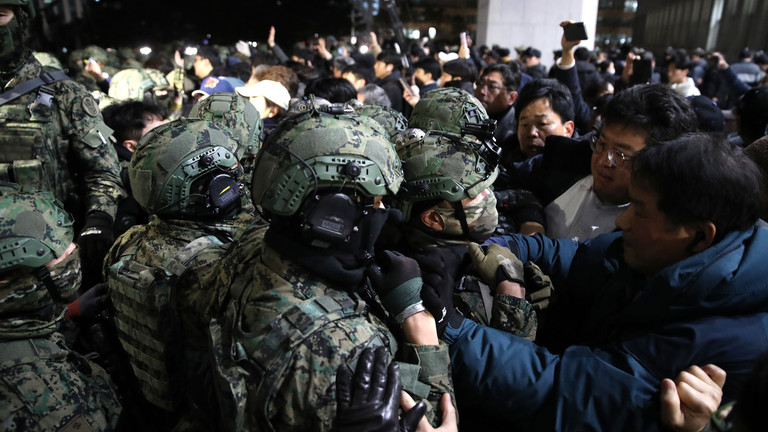
South Korean soldiers tried to enter the National Assembly on December 4, 2024, in Seoul, South Korea. © Chung Sung-Jun/Getty Images
By Konstantin Asmolov, a leading researcher at the Center for Korean Studies at the Institute of China and Contemporary Asia, Russian Academy of Sciences
HomeWorld News
4 December 2024
The political crisis that culminated in South Korean President Yoon Suk Yeol’s short-lived attempt to establish martial law lifted just five and a half hours after he declared it did not come out of the blue. While the opposition has quickly spread its narrative, the situation is undoubtedly more complex and requires closer analysis.
The situation in context
The issue dates back to the 2022 South Korean presidential elections. At that time, Yoon Suk Yeol—a former prosecutor general who, following a conflict with then-South Korean President Moon Jae-in, switched to the conservative camp (even though Yoon had previously prosecuted two conservative presidents)—won the presidential election by 0.73%, an unprecedentedly thin margin in Korean history.
From the start, Yoon faced a challenge because the Democratic Party, the opposition, held a qualified majority of slightly more than half but less than two-thirds of the seats in the National Assembly.
This power dynamic allowed South Korea’s Democratic Party to block presidential initiatives while pushing their agendas, which the president often vetoed. This situation essentially paralyzed legislative activity and fueled the polarization of society.
The parliamentary elections in April 2024 did little to change things. While these elections were a significant defeat for the ruling party, the conservatives garnered slightly more votes than four years earlier (108 versus 103). The Democratic Party failed to secure a two-thirds majority, but it still held a qualified majority, which allowed it to pass or block legislation without regard for political opponents. At that point, it became clear that the crisis that had paralyzed the national legislature would persist for the remainder of Yoon’s term.
Simultaneously, the government initiated criminal proceedings against the controversial opposition leader, Lee Jae-Myung, who had turned mainly the Democratic Party into his fan club. There are substantial grounds for the allegations against him, and setting aside the political polarization of society, he would likely have been imprisoned anyway – even because five key witnesses in various cases either died or committed suicide before they could testify. In one case, he received a suspended sentence, while another resulted in acquittal (deemed a legal miracle). However, he still faces four additional verdicts.
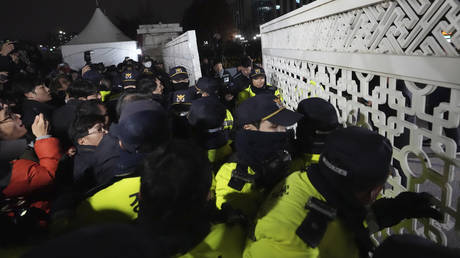
Read more
South Korean president to end martial law after parliament votes to block decree: As it happened
Given that even a suspended sentence approved by the Supreme Court would end Lee’s political career, the situation swiftly evolved into a race of "who will bury whom first”: either the government would convict the leaders of the Democratic Party, or the latter would successfully initiate impeachment proceedings against the president.
Tensions within the ruling party, exacerbated by a campaign called “People for Impeachment” and backed by associated NGOs (including labor unions, university professors, and Catholic clergy), theoretically gave the opposition a chance to amass 200 votes—enough to proceed with impeachment regardless of the underlying reason. However, most of the accusations leveled against the president by opponents are as groundless as his claims about anti-state or pro-North Korean forces, which he used to justify the imposed martial law.
Attempted coup and its possible causes
The events that unfolded during the “five hours of martial law” evoke memories of the military coups led by former South Korean presidents Park Chung-hee and Chun Doo-hwan and the saying, “History repeats itself, first as tragedy, second as farce.”
At 11 pm local time on December 3, following a closed-door meeting allegedly initiated by the Minister of National Defense, President Yoon addressed the nation. For the first time since 1979, imposed “martial law to protect the free Republic of Korea from the threat of North Korean communist forces, to eradicate the despicable pro-North Korean anti-state forces that are plundering the freedom and happiness of our people, and to protect the free constitutional order.”
Yoon accused the opposition of paralyzing the government with anti-state activities. “The National Assembly has become a haven for criminals, paralyzing the judicial and administrative systems and attempting to overthrow the free democratic system through legislative dictatorship,” he said.
Following Yoon’s address, General Park An-soo, the martial law commander, announced a decree banning all political activity, including protests and parties. Military vehicles entered the city; however, despite the blockade of the parliament building, lawmakers, backed by the crowd, managed to get inside. One hundred ninety MPs unanimously voted to rescind martial law according to the country’s constitution. Military forces began to withdraw, and shortly after that, the president made another address to the nation. He said he wanted to safeguard the country, but martial law would be lifted since the parliament opposed his decision.
To say that this story has left me astounded is an understatement. I had earlier considered the possibility of a “top-down coup,” but ultimately, it seemed pretty unlikely. In my opinion, which was expressed in a recent article for the internet journal New Eastern Outlook, “President Yoon, despite his rigid stance, recognizes that he has neither a reason nor an opportunity to impose martial law … Tanks in the streets would spark mass protests, and the army is not prepared to fire on civilians. Ultimately, we could witness a scenario reminiscent of the 1991 Soviet coup attempt, when the opposition consolidated against the president, which led to several casualties and the complete defeat of the coup plotters.”
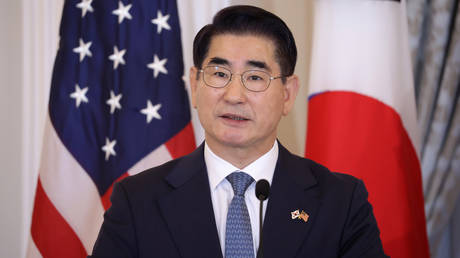
Read more
South Korean defense minister resigns.
Adding to the intrigue, it became clear that neither the Prime Minister of South Korea nor the leader of the ruling party were informed of the president’s decision. The latter was among the first to label the move as incorrect and voted against it in parliament. News of the martial law even reached Washington. US Deputy Secretary of State Kurt Campbell said that the US watched the developments with “grave concern” and reminded Seoul that democracy underpins the US-South Korea alliance and that any political disputes should be resolved peacefully and by the rule of law.
South Korean society did not consider the situation critical, given the fact that the Democratic Party has been talking about the impending dictatorship and urging people to take to the streets since their leader was threatened with imprisonment. As a result, Yoon’s actions backfired on him, and the leaders of the ruling party even condemned him. It’s essential to recognize that today, the South Korean military is not the same as it was during the dictatorship – it is not ready to fire at civilians. In this context, it’s reassuring that the president opted against escalation that could have resulted in bloodshed.
Interestingly, Yoon Suk-Yeol’s actions also puzzled Pyongyang. Instead of airing an entire morning news broadcast, North Korean state media primarily broadcast music. Meanwhile, North Korean newspapers reported that yet another “progressive organization” had called for impeachment without, however, mentioning the recent events. As of the time of writing, the North Korean Central News Agency has still not commented.
What could have prompted the president to make such a seemingly misguided move? As I noted in a previous article, Yoon is pragmatic enough to understand the risks of failure, so it is crucial to understand his motives. At this point, several theories exist.
According to one, Yoon lost his nerve. Another theory suggests that either Yoon or his advisors (reportedly the martial law idea was proposed by Minister of National Defense Kim Yong-Hyun, the former head of the presidential security service and Yoon’s former schoolmate) thought they could get ahead of the situation but misjudged the capabilities and effectiveness of South Korean security forces. A third theory proposes that the decision was made spontaneously under external pressure, forcing the president to go all-in.
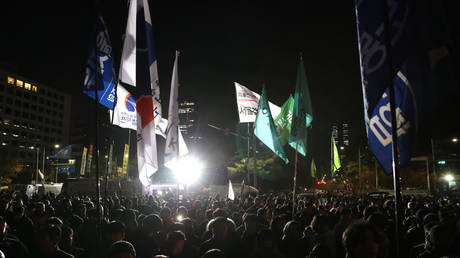
Read more
Moscow asks if the West will sanction South Korea.
A similar idea implies that misinformation from Yoon’s adversaries might have manipulated him into making a move that would lead to his downfall. It’s worth noting that President Yoon is not a seasoned politician. The former prosecutor general, who transitioned into politics just a year before becoming president, may lack a deep understanding of bureaucracy, mainly since the prosecutor’s office in South Korea is a militarized structure with strict internal discipline. We may draw parallels to the Park Geun-hye era when a close circle of advisors manipulated the leader through biased information.
Curiously, some conspiracy theorists believe that the US might have played a role in this affair. Despite Yoon’s pro-American stance, he has not altered his policy regarding Ukraine, and a delegation led by Ukrainian Minister of Defense Rustem Umerov left South Korea empty-handed. Amid the growing ties between Moscow and Pyongyang, there were grounds to suspect that the “red line” between Seoul and Moscow could soon be crossed and South Korea would send military aid to Kyiv, but this did not happen. Therefore, we may not exclude the possibility that the outgoing Biden administration may have provided Yoon with some “trustworthy intelligence,” compelling him to risk everything.
So what comes next? A failure like this, which alienated nearly everyone from the president, is equal to political suicide. The more Yoon clings to power, the lower his already dwindling approval ratings will fall; he will be held accountable for all past mistakes, and getting his point across will be very hard. The opposition has already demanded Yoon’s immediate resignation since an attempt to enact martial law without due justification is considered an act of rebellion. On December 4, opposition parties in the National Assembly filed a motion to introduce an impeachment bill against Yoon. Since many conservative MPs supported the opposition in this decision, they will likely secure the 200+ votes required to impeach the president.
Moreover, the South Korean government and presidential administration have also resigned. Chief of Staff Chung Jin-suk, National Security Bureau Director Shin Won-sik, Chief of Policy Sung Tae-yoon, and other high-ranking officials are among those stepping down.
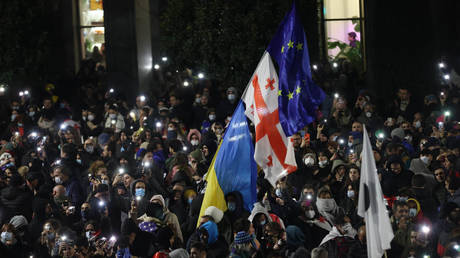
Read more
Fyodor Lukyanov: Can the West still engineer a ‘color revolution’? We’re about to find out.
What does this mean for the major political parties? While impeachment may slow the judicial process against the opposition leader, societal polarization remains high. As a result, the Democratic Party is working to pass retroactive legislation that could shorten statutes of limitations on certain offenses, potentially allowing cases to be dropped. The conservative party has taken a firm stance and distanced itself from the president, so the Conservatives might have a fair shot in the upcoming presidential elections, primarily if the court acts lawfully and Lee is imprisoned.
How does all this affect global instability and Russia’s interests? First, it’s important not to conflate different events. The situations in Georgia, Abkhazia, Syria, and South Korea are unrelated. This has been a long-standing issue for South Korea, and depending on domestic political triggers, it could have unfolded a month earlier or later.
A more pressing question for Russia is whether the new government will be better or worse than the old one regarding Russia’s interests. On the one hand, due to party politics, the Democratic Party might undo the former president’s initiatives, including his pivot toward closer ties with the US and Japan. On the other hand, under President Yoon, South Korea maintained its status as “the friendliest of unfriendly nations” regarding Russia. In contrast, Democrats tend to lean towards populist solutions and have a pro-European agenda that could push them towards supporting Ukraine.
We heavily influence both the conservatives and Democrats in South Korea. The rhetoric of the Democratic Party about strategic autonomy from the U.S. merely reflects internal party struggles. When conservatives emphasize a strong alliance with the U.S., Democrats must counter that narrative. This means concessions must be made elsewhere to secure maneuverability on sensitive issues. President Yoon was fully aligned with Washington on the issue of North Korea but retained flexibility regarding Russia and China. In contrast, Democrats prioritize North Korea, which may lead them to “sacrifice” Russia and China.
Overall, the situation surrounding the declaration of martial law is quite complex. It would be simplistic to believe that the president wanted to establish a dictatorship but that the people thwarted him.
South Korea’s political life will be pretty eventful soon, so stay tuned.
ARE BRICS COUNTRIES ALREADY CHALLENGING THE US-LED WORLD ORDER? | THE BOTTOM LINE

Click Here to Watch Video (24 minutes, 1 second)
Host Steve Clemons
Al Jazeera English
20 October 2024
The American empire has peaked, “and we are on the way down… and we try to hold on”, says Richard Wolff, professor emeritus of economics at the University of Massachusetts Amherst, who notes that the BRICS coalition of economies (Brazil, Russia, India, China and South Africa) is gaining an edge over the United States.
Wolff tells host Steve Clemons that it’s “a challenging experience for Americans” to realize that they lost wars in Vietnam, Afghanistan, and Iraq. And despite unconditional support from the US, Israel will not be able to prevail in the long run.
“Israel is a country of a few million people and is not going to control and run the Middle East … with or without the United States,” argues Wolff.
COMMENTARY | CAN THE NEW APPOINTEES DO THEIR JOBS?
Will they be permitted to do their jobs?

People wait in the hallway outside of the Senate Chamber in Washington on March 24, 2020. Chip Somodevilla/Getty Images
By Jeffrey A. Tucker
Substack.com
4 December 2024
There are some fascinating choices among President-elect Donald Trump’s new appointees. However, a serious question remains: Will they be permitted to do their jobs?
Imagine yourself at the pinnacle of your professional career, following a lifetime of hard work and research. A new president has tapped you to head a major agency with thousands of employees and a budget of many billions of dollars. You bring trusted associates with you. You get the best parking place and the most prominent office, and your picture is on every wall on every floor.
There’s just a slight problem. You don’t have any idea what’s going on at this agency. You only know two things: The public despises this agency, and you must change directions. Many of the employees never show up for work. The parking lot is mostly empty. Remote work is a habit born of COVID-19 that never went away.
The money comes and goes, and no one tracks it. Processes and box-checking rule everything. Each time you try to make some change, you suddenly feel as though you are in an episode of “Yes, Minister.” Every change means spending more money. Everyone smiles at you in the hallway, but you know the truth. There are only two kinds of employees: those who ignore you and those who despise you.
Complicating the picture is that you never even see these people, so meetings have to be on Zoom, and those are arranged only through multiple layers of administrative assistants. Day one comes and goes. Then another week. Another month. Another year. At some point, you dread even coming in. You know that the tenure there is suitable for your career, provided you stay out of harm’s way, which means the media. Your goal is to survive.
Later, some publisher comes to you and asks you to memorialize your tenure. The last thing you are willing to write is that you had no impact on anything. So you come up with various tales of this or that. But in your heart, you know that nothing much really happened. It could never be otherwise because you were never really in charge. The agency ran on its own. You were in the way, at best.
My friends, it’s been this way for many decades. I’ve known some of these appointees, some great people among them. Government agencies are where dreams go to die.
I often think of my friend Jack Kemp, an outstanding football player who retired from the game, read up on economics and human freedom, and fell in love with an idea. His ambition was to liberate the country from bureaucracy and the dependency state. He ended up in politics and then, later, as secretary of the Department of Housing and Urban Development (HUD). I followed his time there closely, but it was never anything but maddening.
He knew it, and I knew it: He was never anything other than a photograph on the wall to which the careerists never paid attention. He tried very hard when he headed HUD from 1989 to 1993. He was determined to leave a lasting mark on the agency and privatize the nation’s public housing stock while creating enterprise zones in every city. What he ended up doing instead was spending more money than ever.
This is my main concern about such appointments. We must remember that any tenure at a government agency over many decades can be judged a grand success. The agencies are set up to resist any change.
We have a new crop of appointees headed to Washington. The hopes of an entire nation are with them, and many people worldwide wish them well. However, they are more than aware of the challenges they face.
They know that getting such an appointment is a moment of high prestige, but they also know that they will immediately confront thousands of employees who despise them and the administration for which they work. They will pull all the old tricks to foil any change. But isn’t that a firing offense? In bureaucracy, there is no such thing.
Unlike every job in the private sector, employees within the federal civil service can only be terminated with cause, such as gross incompetence or abuse. In practice, it just doesn’t happen. More specifically, the turnover rate in the civil service is 0.4 percent as compared with 5 percent to 10 percent in the private sector.
The bottom line is that these new department heads must be in charge. They cannot be. It’s because they cannot do what Elon Musk did when he bought Twitter: order new leadership and replace staff that are either non-performing or performing tasks that need to be eliminated. There can be no consolidation or modernization. There is no applying the hot foot to get things done because people only do what is in their job descriptions, which you don’t even have the power to change.
The terrible secret of government is that the names on the placards are primarily for looks. It’s been true for all of our lives because the civil service is one of the most protected and secure lines of work available anywhere. Everyone knows this. The benefits are enormous, the salaries high, the work demands low, and the retirement packages are extremely impressive if you stay there long enough.
To be sure, most people in the federal workforce are miserable. Every business survey shows this, and you know it from just having a few conversations at lunchtime if you happen to catch any employees at the park taking their lunch hour. They don’t like their lives but fear their lives even more outside of this cocoon of government employment.
It wasn’t always this way. From the time of the federal government's establishment in 1789 to a century later—an era that yielded the highest economic growth ever seen until that point in history—government employment was just like that in the private sector. You worked until conditions changed, and then you could get terminated. Everyone knew the new administration would move old and new people out.
It stands to reason that this is a democracy with republican institutions. That is to say, the people are in charge, not the bureaucrats. People get their way When they vote for new management and new institutions. That’s because the people are sovereign under the law.
In 1883, the civil service was invented. The idea was that government in a scientific age needed real experts in charge. Those are not the same as the people who are hired by whatever politician happened to win the presidency. Scientists require people with real experience, non-political and dispassionate workers within the system. That’s the only way to build a great government rather than one that bounds from one upheaval to another.
The idea works on paper. In practice, this notion can get out of hand. Indeed, you can wreck any institution on earth by granting its workers permanent status. This is what has happened throughout many wars and crises. The agencies grew in workforce, budgets, and influence.
The new administration will try to shake things up in federal employment practices, which is long overdue. One method is Schedule F, which would reclassify policy-focused employees as subject to new standards and possible termination. This idea is moderate. Two weeks before his last term, Trump passed it as an executive order two weeks before, but Biden immediately reversed it.
Certainly, Schedule F will return, but the reforms we need are much broader. The entire notion of the civil service needs a total overhaul, and it needs to happen from day one. Otherwise, these earnest new appointees will show up and need help to do their jobs. It’s too late for such fussing around. We need dramatic changes in the functioning of government itself to restore it to conform to the Constitution.
The Constitution does not include a fourth branch of government. There are only three, and the chief executive needs to be in charge of all agencies that survive much-needed cuts. Otherwise, we will have another crop of excellent professionals come and go, reduced again to photographs on the wall.
Jeffrey A. Tucker is the founder and president of the Brownstone Institute. He has written thousands of articles in the scholarly and popular press and ten books in five languages, most recently Liberty or Lockdown. He is also the editor of The Best of Ludwig von Mises. He writes a daily column on economics for The Epoch Times and speaks widely on economics, technology, social philosophy, and culture.
ANALYSIS | HOW SOUTH KOREA AND GEORGIA COULD ACCELERATE ISRAEL'S DEMOCRATIC COLLAPSE
Despite their very different circumstances, there are similarities in the authoritarian 'wave' threatening all three societies. This is why, together with the imminent Trump presidency, South Korea and Georgia could galvanize Israel's democratic decline.

LEFT: Demonstrator demanding the resignation of South Korean President Yoon Suk Yeol in Seoul. RIGHT: Demonstrator wears a Georgian flag balaclava at opposition protest in Tbilisi against the suspension of EU accession talks Credit: Philip Fong/AFP, Irakli Gedenidze/Reuters
By Dahlia Scheindlin
Haaretz | Israel News
5 December 2024
Israelis don't have a lot of bandwidth for other people's problems these days, but they ought to be watching at least two different countries this week: South Korea and Georgia.
South Korean President Yoon Suk Yeol shocked the world and his people by declaring martial law on Tuesday. The country faced turmoil as citizens flocked to the streets, legislators smuggled themselves into parliament and sprayed fire extinguishers at soldiers, then voted to overturn his decree. Some parliamentarians from the president's party joined the majority against him.
About six hours after the declaration, he rescinded the order—but not before South Koreans revived fears of their not-so-distant non-democratic past. It remains to be seen whether he will be impeached.
- It can't happen here? Israeli democracy is fighting for its life
- Elections highlight Moldova and Georgia's dilemma: European embrace or Russian bear hug?
- How can someone who believes in freedom support a dictatorial regime?'
Georgia's drama is not over yet. Last week, the prime minister suspended EU accession talks, triggering mass protests. Although the ruling party is known as the Georgian Dream, its pro-Russian ideology is not shared by many citizens, who view joining Europe as the pathway to a democratizing future.
On the surface, these countries' upheavals seem to resemble Israel's problems. However, all three societies—and the world at large — are ultimately mired in a struggle over democracy, and this broader struggle could encourage or even accelerate Israel's democratic collapse.
Forced comparisons are unnecessary; each country has its root causes. Israel's decline did not start with its 37th government, established in late 2022, or with Benjamin Netanyahu's rule.
At the heart of Israel's vulnerability is its missing democratic foundations. These are missing mainly due to the combination of theocratic political forces and its refusal to include Palestinian citizens within the framework of full constitutional equality by declining to commit formally to such a framework at its founding or any time since.
Continue Reading … or Listen to this Article Now (7 minutes, 55 seconds)
BUILDING THE BRIDGE! | A WAY TO GET TO KNOW THE OTHER AND ONE ANOTHER
Making a Difference – The Means, Methods, and Mechanism for Many to Move Mountains
.jpg)
Photo Credit: Abraham A. van Kempen, our home away from home on the Dead Sea
By Abraham A. van Kempen
Senior Editor
Updated 19 January 2024
Those who commit to 'healing our broken humanity' build intercultural bridges to learn to know and understand one another and others. Readers who thumb through the Building the Bridge (BTB) pages are not mindless sheep following other mindless sheep. They THINK. They want to be at the forefront of making a difference. They're in search of the bigger picture to expand their horizons. They don't need BTB or anyone else to confirm their biases.
Making a Difference – The Means, Methods, and Mechanism for Many to Move Mountains
Accurate knowledge promotes understanding, dispels prejudice, and awakens the desire to learn more. Words have an extraordinary power to bring people together, divide them, forge bonds of friendship, or provoke hostility. Modern technology offers unprecedented possibilities for good, fostering harmony and reconciliation. Yet its misuse can do untold harm, leading to misunderstanding, prejudice, and conflict.
A Free Trial for Life – SUBSCRIBE NOW!

• It's quick and straightforward.
• We won’t ask for your credit card number.
• Just enter your e-mail address to receive your complimentary free-for-life subscription to our newsletter.
• Please include your First and Last Name.
• We won’t share or sell your e-mail address.
_________________________
Related Articles Recently Posted on www.buildingthebridgefoundation.com:
________________________
The views expressed are solely those of the author and may or may not reflect those of the Building the Bridge Foun
LATEST OPEN LETTERS
-
03-02TO WORLD LEADERS
-
06-01Standing in Solidarity with the People of Venezuela
-
21-07Freedom
-
20-03Stand up to Trump
-
18-02Average Americans Response
-
23-12Tens of thousands of dead children.......this must stop
-
05-06A Call to Action: Uniting for a Lasting Peace in the Holy Land
-
28-05Concerned world citizen
-
13-02World Peace
-
05-12My scream to the world
VIRTUAL POST OFFICE
PETITIONS
LINKS
DONATION
Latest Blog Articles
-
04-03Our Wednesday News Analysis | Editorial | A Regime Change is On the Rise
-
04-03Editorial | A Regime Change is On the Rise
-
03-03Debunked and Confirmed: Myths and Realities from the Iran War
-
03-03The Suicidal Folly of a War with Iran
-
02-03The Evangelical Pope | "Prayer is not only speaking but, above all, listening."
-
26-02Our Friday News Analysis | What the World Reads Now!
-
25-02Our Wednesday News Analysis | Rubio declared a return to brutal western colonialism – and Europe applauded
-
24-02Rubio declared a return to brutal western colonialism – and Europe applauded
-
24-02The Palestinian Authority's new constitution: A roadmap to statehood?
-
24-02No explanation, no appeal: Israel revoking entry authorization of foreign activists
-
23-02The Evangelical Pope | Faith Unites and Strengthens Bonds
Latest Comments
 One of the most important and illuminating articles that I …
One of the most important and illuminating articles that I …
Comment by Benjamin Inbaraj And what's wrong here?
After all, there is the homeland …
And what's wrong here?
After all, there is the homeland …
Comment by Isac Boian Does this reinforce or deny my argument that Israel is …
Does this reinforce or deny my argument that Israel is …
Comment by Edward Campbell Many 'say' they support the Palestinian cause but do little …
Many 'say' they support the Palestinian cause but do little …
Comment by Philip McFedries The UN is strangled by the "war for profit" cabal …
The UN is strangled by the "war for profit" cabal …
Comment by Philip McFedries I can't read the printing on the map.
I can't read the printing on the map.
Comment by Philip McFedries Good news!
Good news!
Comment by Philip McFedries
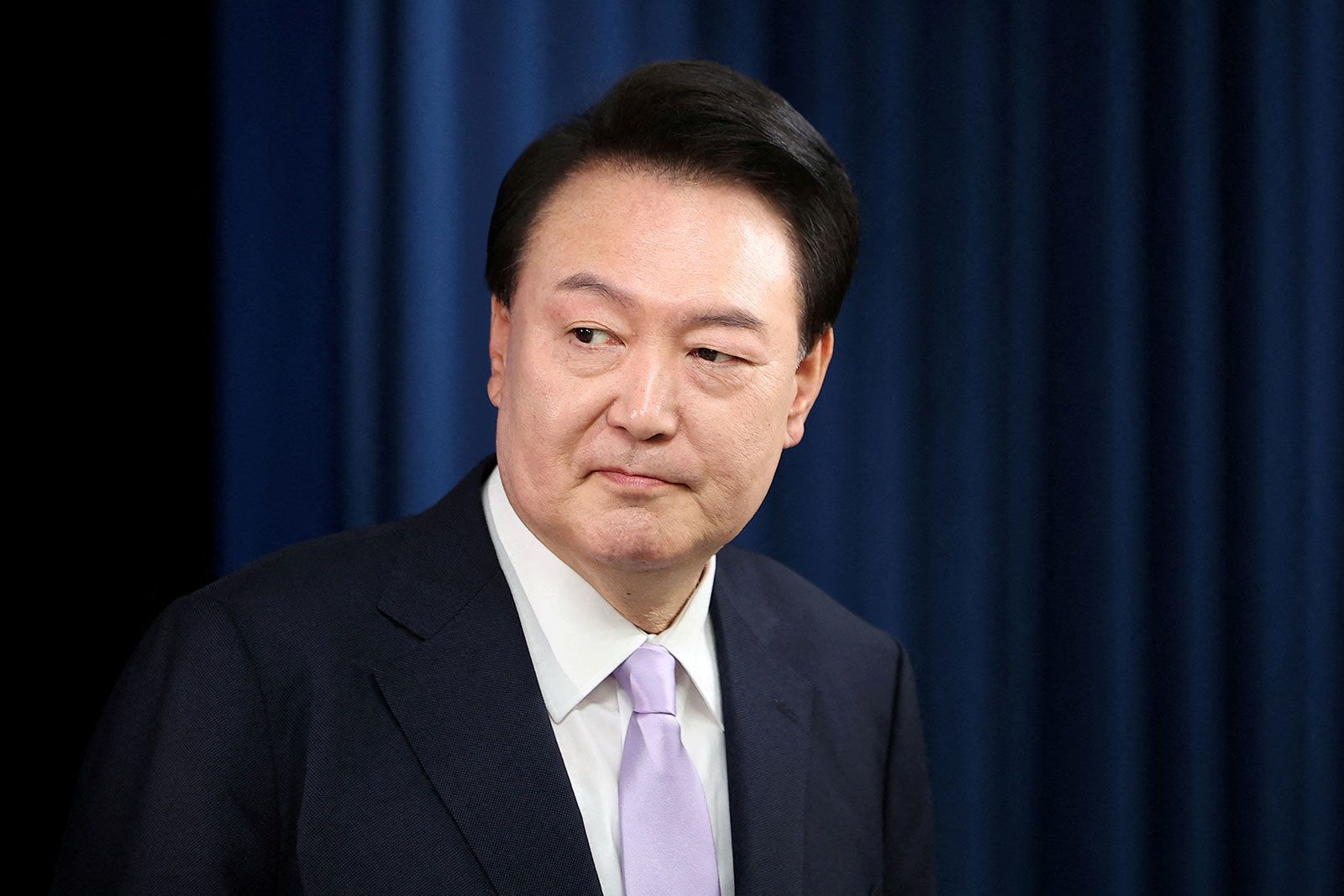

COMMENTS
This article has 0 comments at this time. We invoke you to participate the discussion and leave your comment below. Share your opinion and let the world know.